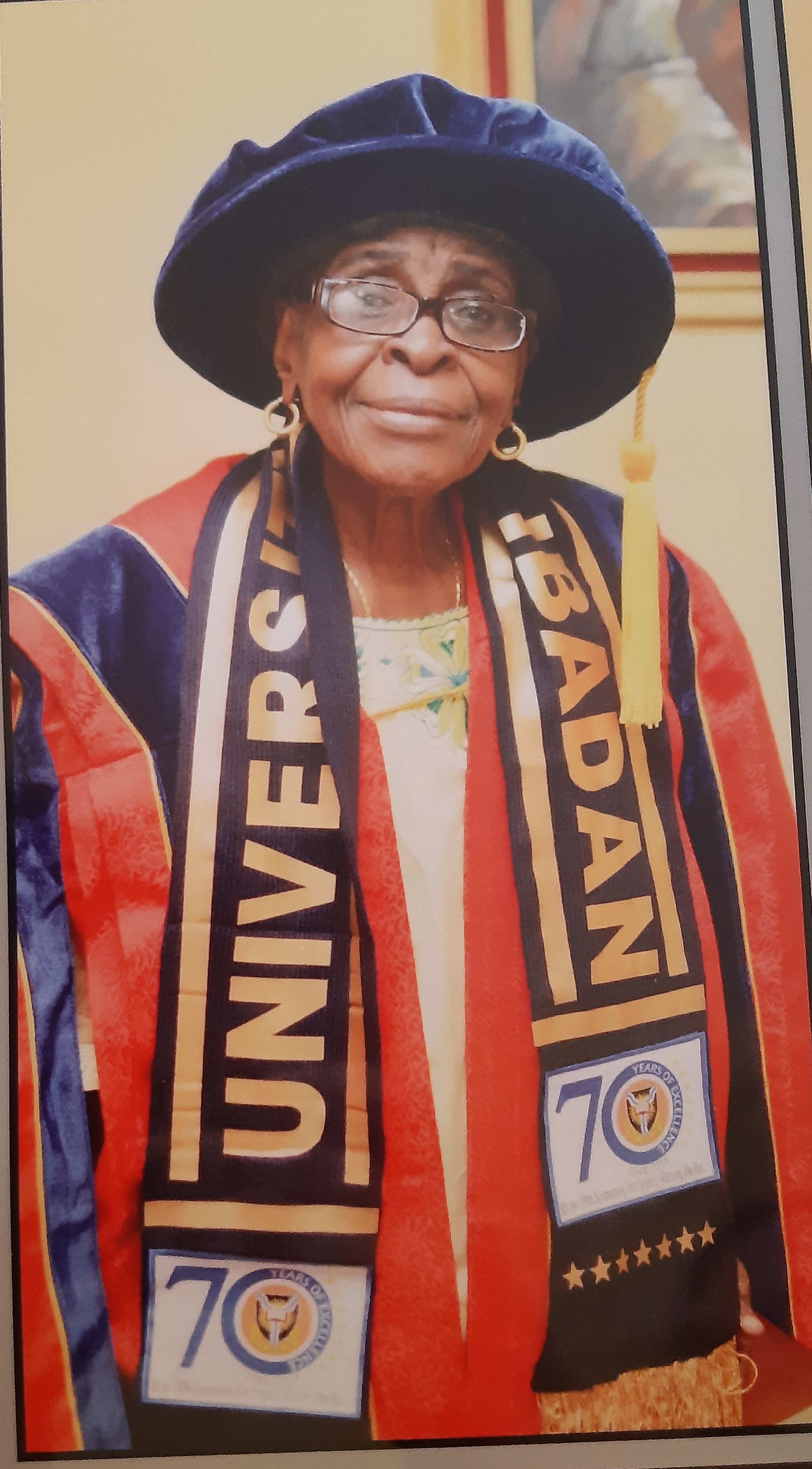Une pionnière de l'histoire orale et de l’histoire des femmes au Nigeria
Entretien avec la Professeure Bolanle Awe
DOI :
https://doi.org/10.51185/journals/rhca.2022.entretien01Mots-clés :
études de genre, histoire des femmes, Nigéria, historiographie nigériane, Bolanle AweRésumé
Cet entretien donne la parole à la Professeure Bolanle Awe, une pionnière de l’histoire orale et de l’histoire des femmes au Nigeria. Bolanle Awe propose un retour sur sa formation en tant qu’historienne et sur des épisodes de son parcours intellectuel et académique. Née en 1933 à Ilesha, une ville secondaire du sud-ouest du Nigeria, elle se forme en tant qu’historienne dans ce qui était alors la métropole britannique avant d’enseigner au Nigeria à partir de 1964. Ces échanges donnent à voir le parcours professionnel d’une femme de l’intelligentsia nigériane, dont la carrière d’historienne s’étend de la période coloniale tardive jusqu’en 1998. Ces souvenirs d’une trajectoire académique exceptionnelle mettent également en lumière les réticences du milieu universitaire britannique, largement blanc, vis-à-vis des étudiant.e.s des colonies ainsi que celles du milieu universitaire nigérian, largement masculin, vis-à-vis d’une femme maîtresse de conférences et professeure.
Références
AJAYI J.-F. Ade et SMITH Robert Sellers (1971), Yoruba Warfare in the Nineteenth Century, Cambridge, Cambridge University Press.
AJAYI J.-F. Ade (1981), Christian Missions in Nigeria 1841-1891: The Making of a New Elite, London, Longman. ADERINTO Saheed et FALOLA Toyin (2010) « Bolanle Awe. Yoruba and Gender Studies », in Nigeria, Nationalism, and Writing History, Rochester, University of Rochester Press, pp. 142-56.
ADERINTO Saheed et FALOLA Toyin (2010) Nigeria, Nationalism, and Writing History, Rochester, University of Rochester Press.
AGBAJE Adesola Adetutu (1995), « Bolanle Alake Awe: a Biography », MA thesis, University of Ibadan.
ANENE Joseph Christopher (1966), Southern Nigeria in Transition, 1885-1906, Cambridge, Cambridge University Press.
ANENE Joseph Christopher (1970), The International Boundaries of Nigeria, 1885-1960, London, Longman. BIOBAKU Saburi O. (1960), The Origin of the Yoruba, Lagos, Federal Information Service.
AWE Bolanle (1964), The Rise of Ibadan as a Yoruba Power in the Nineteenth Century, thèse, Oxford, Oxford University.
AWE Bolanle (1977), « The Iyalode in the Traditional Yoruba Political System », in A. Schlegel (dir.), Sexual Stratification: A Cross-Cultural View, New-York, Columbia University Press, pp. 144-59.
AWE Bolanle (1977), « Reflections on the Conference on Women and Development: I », Signs, vol. 3, no 1, pp. 314-316.
AWE Bolanle (1988), « Nigerian Women’s Visions and Movements: An Overview », communication présentée à la journée d’étude à la conférence DAWN sur le thème « Africa Regional Meeting on Food, Debt Crises in Relation to Women », Institute of African Studies, University of Ibadan.
AWE Bolanle (1991), « Writing Women into History: The Nigerian Experience », in Karen Offen, Ruth Roach Pierson, et Jane Rendall (dir.), Writing Women’s History: International Perspectives, London, Palgrave Macmillan, pp. 211-220.
AWE Bolanle et alii (1991), « Editorial », Signs, 16(4), pp. 645-49.
AWE Bolanle et MBA Nina (1991), « Women’s Research and Documentation Centre (Nigeria) », Signs, 16(4), pp. 859-64.
AWE Bolanle (1992) (dir.), Nigerian Women. A Historical Perspective, Ibadan, Bookcraft.
AWE Bolanle (1992), « Women and popular participation », communication présentée à la journée d’étude Cowan/Wordoc sur le theme « Women and Popular Participation », Institute of African Studies, University of Ibadan.
ASHAYE Yomi Leon et AWE Bolanle (2016), Nigerian Women Pioneers and Icons, Ibadan, Childsplay Books Limited.
BIOBAKU Saburi O. (1973), Sources of Yoruba History, Oxford, Clarendon Press.
DIKE Kenneth O. (1965), Trade and Politics in the Niger Delta, Oxford, Clarendon.
FALOLA Toyin, « Celebrating Bolanle Awe: The Matriarch of Feminist History », The Punch Nigeria, 9 November 2018.
FELTHAM FORBES Jacob, « How a King's History Student Founded a School of Historical Thought in 1950s Africa », King’s College London, Spotlight on Research, 11 October 2020.
IKIME Obaro (2001), Groundwork of Nigerian History, Ibadan, Heinemann Educational Books. ISIUGO-ABANIHE Ifeoma et alii (dir.), Bolanle Awe: Portrait of an Academic and Activist (1999), Ibadan, Women’s Research and Documentation Centre.
OLAWALE Ronke (2019), Interview with Bolanle Awe, Global Feminist Project.
PANATA Sara (2020), Le Nigeria en mouvement(s) : la place des mouvements féminins et féministes dans les luttes socio- politiques nationales (1944-1994), Ph.D. dissertation, Paris, University of Paris 1.
PERHAM Margery Freda (1962), Native Administration in Nigeria, London, Oxford University Press.
PERHAM Margery Freda (1963) (dir.), Ten Africans, London, Faber and Faber.
PERHAM Margery Freda (1960), Lugard: The Years of Authority, 1898-1945 ; the Second Part of the Life of Frederick Dealtry Lugard, Later Lord Lugard of Abinger, London, Collins.
TAMUNO T.N. (1972), The Evolution of the Nigerian State the Southern Phase, 1898-1914, London, Longman. TREVOR-ROPER Hugh (1963), « The Rise of Christian Europe », The Listener, p. 871.

Téléchargements
Publiée
Comment citer
Numéro
Rubrique
Catégories
Licence
Certains droits réservés 2021 Mutiat Titilope Oladejo, Sara Panata

Ce travail est disponible sous licence Creative Commons Attribution - Pas d’Utilisation Commerciale 4.0 International.







